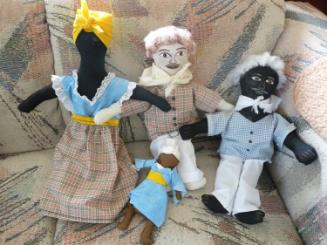Southern New England Apprenticeship Program Year 15 Session: Ivelisse Pabón and Amanda Mercado
PerformerPerformed by
Amanda Mercado
Date2013 April 26
Mediumborn digital video
DimensionsDuration: 19 Seconds
ClassificationsGraphics
Credit LineConnecticut Cultural Heritage Arts Program collections
CopyrightIn Copyright
Object number2015.196.319.3
DescriptionThis event was one of the teaching sessions of the Southern New England Apprenticeship Year 15 team in Puerto Rican doll making with teaching artist Ivelisse Pabón and apprentice Amanda Mercado.
Video of Ivelisse Pabón discussing how scissors are needed to make the dolls.
NotesSubject Note: The Southern New England Traditional Arts Apprenticeship Program is a CCHAP initiative since 1997 that fosters the sharing of community-based traditional (folk) artistic skills through the apprenticeship learning model of regular, intensive, one-on-one teaching by a skilled mentor artist to a student/apprentice. The program pairs master artists from Rhode Island, Massachusetts, or Connecticut with apprentices from one of the other states, as a way to knit together members of the same community or group across state lines. Teaching and learning traditional arts help to sustain cultural expressions that are central to a community, while also strengthening festivals, arts activities, and events when master/apprentice artists perform or demonstrate results of their cooperative learning to public audiences. The Connecticut Cultural Heritage Arts Program at the Connecticut Historical Society manages the program in collaboration with the Folk Arts Program at the Massachusetts Cultural Council and independent folklorist Winifred Lambrecht who has a deep knowledge of the folk arts landscape of Rhode Island. Primary funding for the program comes from the National Endowment for the Arts, with support also from the Connecticut Commission on the Arts, the Institute for Community Research, and the Connecticut Historical Society.Video of Ivelisse Pabón discussing how scissors are needed to make the dolls.
Biographical Note: Ivelisse Pabón de Landrón, the founder of Soy Negra Productions, is a textile artist who crafts dolls featuring characters from Puerto Rican folklore, especially Jibaro figures (farmers and other Puerto Ricans living in the countryside). She is the great-great-grand-daughter of a woman who was brought to Puerto Rico in 1834, from Africa to work in the sugar plantation in Vega Alta. Ivelisse grew up in the barrio of the Lower East Side, where her mother was a community organizer. As an adult, Ivelisse relocated to Massachusetts, but then moved to Puerto Rico for a few years. “I wanted to know about my heritage. I wanted to understand the culture, because my dad was black and my mom was white. I wanted to know why the culture was the way it was — the music, the food, the dancing.” Having learned doll making from her mother, Ivelisse went on to do extensive research on the Puerto Rican black doll and sought out older doll makers in Puerto Rico to learn from them. She marketed her dolls at the Plaza in Old San Juan. Ivelisse is passionate about preserving the history of the black doll as a way of honoring Puerto Rican women of African descent and their contribution to Puerto Rican cultural history. A skilled educator, Ivelisse presented her work at a cultural event held at the Park St. Library in Hartford in 2012, and at the Lowell Folk Festival crafts area. She taught the process of Puerto Rican doll-making to Amanda Mercado in the Southern New England Traditional Arts Program in 2012-2013. Ivelisse taught Amanda the entire process of doll-making, from the cultural background to design to selection of materials, shaping the body, embroidering or painting the face, and dressing the doll in jibaro clothes. The experience was very useful to Amanda in her career as a social worker with a strong interest in art therapy. Their curriculum/teaching plan is in the institutional archive. Ivelisse also created a power point that she presented at their final exhibition at the Mi Casa community educational center on Park St. in Hartford. Ivelisse relocated to New Jersey around 2018.
Additional audio, video, and photographic materials exist in the archive relating to these artists.
Cataloging Note: This project was made possible in part by the Institute of Museum and Library Services MA-245929-OMS-20.
Status
Not on viewIvelisse Pabón de Landrón
2013 April 26


